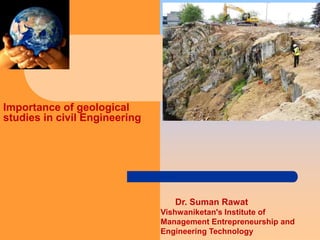Introduction to engineering geology
- 1. Dr. Suman Rawat Vishwaniketan's Institute of Management Entrepreneurship and Engineering Technology Importance of geological studies in civil Engineering
- 2. 6/28/2020 •STABILITY • SAFETY • • ECONOMY Scope of Engineering Geology
- 3. Engineering Geology Engineering geology is a branch of applied sciences which deals with the application of geology for safe, stable and economic design and construction of a civil engineering project. Application of geological knowledge in planning, designing and construction of a civil engineering project is absolutely essential. Engineering geologic studies may be performed during the planning, environmental impact analysis, civil or structural engineering design, value engineering and construction phases of public and private works projects, and during post-construction and forensic phases of projects.
- 4. Objectives 6/28/2020 It enables a civil engineer to understand engineering implications of certain geological conditions related to the area of construction. It enables a geologist to understand the geological information that is absolutely essential for a safe design and construction of a civil engineering project.
- 5. 5 Why Engineering geology? • Serve civil engineering to provide information in 3 most important areas: 1. Finding stable foundations. 2.Resources for construction; aggregates, fills and borrows. 3. Mitigation of geological hazards; Identify problems, evaluate the costs, provide information to mitigate the problem Importance of engineering geology in Civil Engineering practice
- 6. 6/28/2020 In construction •In all types of heavy construction like building tower, dams, reservoirs, highways, bridges, traffic and hydropower tunnel and retaining structure, knowledge of geology is essential. • The geological information about the site of construction (or excavation) and about the natural materials of construction is of paramount importance. •This information is vital for planning realistic and designing and economic excavation of one and all of such projects. Scope of Engineering Geology
- 7. 6/28/2020 In Planning •It provides the engineer with a general guidance about the suitability of the site for a proposed project. • It enables to appreciate the limiting factors imposed upon his planning by topography, geomorphology, ground water conditions etc. of the area. •It gives the engineer a general idea about the availability of different types of construction material. •It guides him in limiting the Drilling for selecting the final site to such number as would be absolutely essential. Scope of Engineering Geology
- 8. 6/28/2020 In Designing •The existence of hard rock and their depth from an inclination with the surface. •Mechanical properties of the rocks along the proposed site, especially, bearing strength, shear strength, modulus of elasticity, permeability and resistance to decay and disintegration. •Presence of structurally weak plans (Joints, Faults and Fractures) and weak zones (Peat deposits and sheared zones). Scope of Engineering Geology
- 10. Plate Tectonic Theory 6/28/2020 Scope of Engineering Geology
- 11. Physical Geology and Geomorphology
- 12. A mineral is a naturally occurring inorganic solid, with a definite chemical composition, and an ordered atomic arrangement. simpler. Minerals are naturally occurring. They are not made by humans. Minerals are inorganic. Examples include quartz, feldspar minerals, calcite, sulfur and the clay minerals such as kaolinite and smectite Mineralogy
- 13. Structural Geology Folds, Faults, and other Records of Rock Deformation
- 14. Economic Geology
- 15. PETROLOGY • a branch of geology, which deals with study of rocks (Petro=rock, Logos=study) ROCKS IGNEOUS -most abundant -primary rocks -source is magma or lava SEDIMENTARY -thin veneer above the Sial and Sima in Oceanic and Continental Crusts -secondary rocks METAMORPHIC -proportion is similar to that of Igneous rocks -change of forms of Igneous and Sedimentary due to Temperature, Pressure and Chemical Fluids
- 16. Petrology
